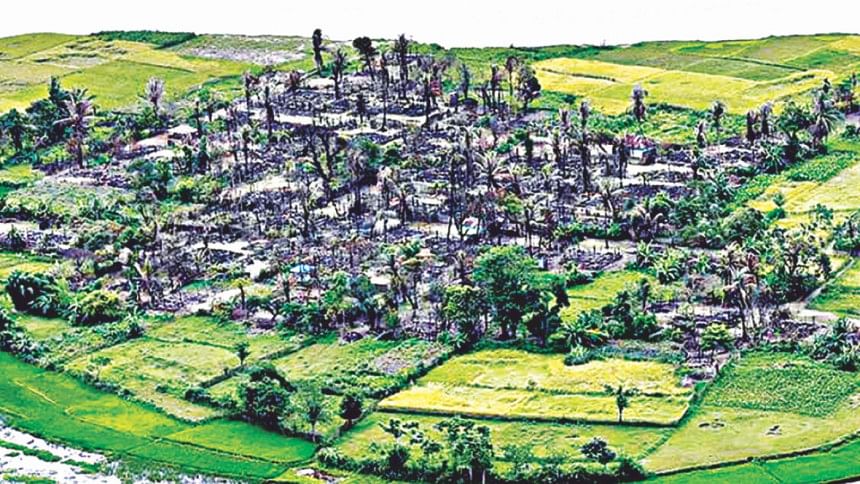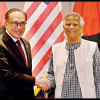Rohingya Deportation: War crimes prosecutor seeks to open probe

The chief prosecutor for the International Criminal Court has asked judges to rule whether she can open a probe into the mass deportations of the Rohingya people from Myanmar.
According to an AFP report, ICC Chief Prosecutor Fatou Bensouda made the unprecedented move late Monday. She contended that “consistent and credible reports ... indicate that since August 2017 more than 670,000 Rohingya, lawfully present in Myanmar, have been intentionally deported across the international border into Bangladesh”.
She asked judges to rule whether the court may exercise jurisdiction over the alleged deportation.
Opening a preliminary probe into the Rohingya's plight is legally complicated for the tribunal as Myanmar, unlike Bangladesh, is not a member of the ICC.
“This is not an abstract question, but a concrete one,” Bensouda said in her filing to judges.
The development at the ICC comes amid calls from across the world to hold Myanmar accountable for the atrocities following “militant attacks” in August last year.
At least 6,700 Rohingyas were killed by Myanmar security forces in one month following a government-led crackdown in the country's Rakhine State in late August, according to Doctors Without Borders (MSF). Many women were raped, while Rohingya villages were torched.
The UN termed the atrocities “ethnic cleansing”, while human rights groups defined those as genocide and crimes against humanity though Myanmar rejected the allegations.
Adama Dieng, UN special adviser on the prevention of genocide, during a visit to Bangladesh early last month said, “International crimes were committed in Myanmar. Rohingya Muslims have been killed, tortured, burnt alive and humiliated, solely because of who they are.”
He said all the information he received indicates that the intent of the perpetrators was to cleanse northern Rakhine of their existence, possibly even to destroy the Rohingya as such, which, if proven, would constitute the crime of genocide.
Three female Nobel Peace laureates, who also visited Bangladesh in the first week of March, urged Bangladesh, the UN and other state parties to refer Myanmar military and other perpetrators to the ICC for the “genocide” against the Rohingyas.
Asked how Myanmar could be taken to the ICC as it is not a state party to the Rome Statute that establishes the ICC, Shirin Ebadi, a legal expert and one of the Nobel laureates, said the UN Security Council can recognise Myanmar's crimes against humanity and then refer it to the ICC.
The possibility of the UN Security Council referring the issue to the ICC was also slim as the veto powers China and Russia are against any action against Myanmar.
The Nobel laureates in a statement said: “Alternatively, the ICC prosecutor should open an independent investigation into the crimes against humanity and genocide perpetrated in Rakhine state.”
Now, after over seven months into the crisis, ICC Chief Prosecutor Bensouda is seeking a ruling on the jurisdiction to the ICC.
She argued her office did have authority to investigate the situation, saying such a move “would be consistent with the legal framework” of the Rome Statute, which underpins the court's work as well as “well-established principles of criminal jurisdiction”.
She likened deportation to “a cross-border shooting”, arguing the crime “is not completed until the bullet [fired in one state] strikes and kills the victim [standing in another state]”.
Bensouda asked the tribunal to set up a special chamber to examine and rule on her request, urging that it be dealt with in an "expeditious" manner.
Set up in 2002 in The Hague, the ICC is the world's only permanent war crimes court and it acts to prosecute the worst abuses, including genocide, in places where national tribunals are unwilling or unable to act.
Contacted, Prof Mizanur Rahman of Dhaka University's law department said it was expected that the ICC prosecution would initiate an investigation into the alleged crimes against humanity as it already recognised that the crimes committed by the Myanmar security forces were international in nature.
Dr Mizanur Rahman, former chairman of National Human Rights Commission, said Myanmar still has a strong international lobby. “So, it will depend on how Bangladesh can mobilise international support for holding Myanmar accountable.”
Such question by the ICC prosecutor reflects the complex nature of the Rohingya crisis, he said.
Mizanur suggested that Bangladesh should continue a strong diplomatic engagement to ensure that the crimes by Myanmar are tried in the ICC.

 For all latest news, follow The Daily Star's Google News channel.
For all latest news, follow The Daily Star's Google News channel. 








Comments